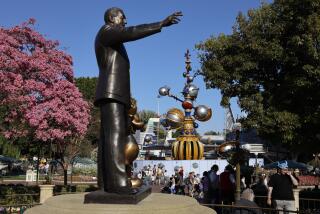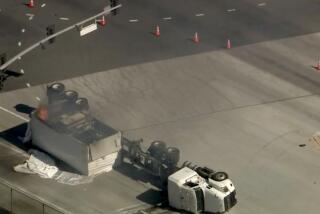Children of Cold War Combatants Recall Era
Three descendants of key Cold War politicians gathered in a small meeting room Monday to share personal remembrances with UC Irvine political science students and bring to life a recent era that many young people have already dismissed as ancient history.
David Eisenhower, grandson of President Dwight Eisenhower; his wife, Julie Nixon Eisenhower, daughter of President Richard Nixon; and Sergei N. Khrushchev, son of Soviet Premier Nikita Khrushchev, spoke to students as a prelude to Monday night’s talk at the Irvine Barclay Theatre: “Sons & Daughters of the Cold War: Private Perspectives vs. Public Perceptions.”
More than 600 people purchased tickets for the evening talk, a UCI spokesman said. The presentation was followed by the invitation-only dinner that honored the former Cold War leaders. On the menu: a cold curry soup that President Eisenhower and his wife served the Khrushchevs in 1959, a vodka toast and the Nixon Family Boston Cream Pie.
David Eisenhower spoke about the side effects of the Cold War on American society: the scars of the Vietnam War, rapid development of technology that stemmed from the arms race and creation of a generation of hippies who grew up with both marked privileges and “an incredible uncertainty about the future.”
Khrushchev, an engineer and close advisor to his father, stressed how widely perspectives of the Cold War differed among Soviets, Americans and Cubans.
Accustomed to centuries of war on the continent, Soviets were less alarmed by the Cold War threat, he said. Because of censored media, Soviets were also less informed, and therefore did not experience the 1962 Cuban Missile Crisis with the same degree of panic as their U.S. counterparts, he said.
Misperceptions and misunderstandings dominated the era, Khrushchev added, and continue to this day.
“We still don’t understand each other,” he said. “An average Russian today will say democracy is linked with crime, and America did all these bad things to us [by encouraging democracy].”
In a lighter moment, Khrushchev spoke of his father’s apprehension at being invited to Camp David, associating “camps” with hard labor. “He said, ‘Why doesn’t the president want to talk to me in the capital? Why does he want to take me to some camp?’ ”
More to Read
Sign up for Essential California
The most important California stories and recommendations in your inbox every morning.
You may occasionally receive promotional content from the Los Angeles Times.











